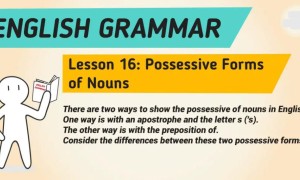大家都知道片语except for、apart from以及单字except、besides皆用来表示「除了」,并且他们在用法上也有相似之处。因此小编今天想帮助大家学习辨别它们间之差异。
⠀
except / except for
除了…之外、不包括
⠀
虽然这个单字与其片语意思相同,但用法上却不同,不能互换。针对单字except,它后面既可接名词、名词片语,也可接子句、介系词片语、甚至可接原型动词、不定词或动名词。然而片语except for由于介系词for之故,后面只能接名词或名词片语。
⠀
except>
⠀
例句1:
You are allowed to smoke everywhere except in the lobby.
(你可以在除了大厅之外的任何地方抽烟。)

例句2:
The dish you cooked was great except that it could use more salt.
(你煮的这道菜很棒,就是味道可以再咸一点。)
这两个例句中的except无法以except for来替代,因为后面接的是介系词片语及子句。
⠀
根据句子动词部分的用法,except后也可接原型动词、不定词或动名词。
例句1:
The boy didn’t do anything except cry last night.
(这个男孩昨晚除了哭以外什么也没做。)
*由于助动词didn’t,故except后面接的是原型动词
例句2:
Jason is good at everything except swimming.
(杰森什么都很擅长,除了游泳之外。)
*动词为片语be good at,故except后面接的是动名词
例句3:
Wilson seldom goes out except to work.
(威尔森很少外出,除了工作之外。)
*表示「目的、意图」时,except后面使用不定词
⠀
except for>
例句1:
My manager loves my report except for the few mistakes I made.
(除了我犯的几个错误之外,我经理觉得我这份报告很好。)
例句2:
The parrot is totally green except for its yellow wings.
(这只鹦鹉除了翅膀是黄色以外,其它地方都是绿色的。)
⠀
有个值得注意的地方是,只有当句子中出现「涵盖所有」的词(如all、any、every、nobody、nothing等等)时,except后面才会接名词或名词片语;此时except与except for便可互换。
例句1:
She won’t eat anything except/except for chicken nuggets and chips. (除了鸡块和洋芋片外,她不吃任何东西。)
例句2:
Nobody I know loves fishing except/except for him.
(我认识的人除了他之外,没有人喜欢钓鱼。)
⠀
另外,提醒大家except for可以放在句首,但except则不能。
例句:
Except for the service, I enjoy everything about this restaurant.
(除了服务之外,我觉得这间餐厅还不错。)
⠀
-
⠀
apart from>
除了…以外、除了…以外还有…
⠀
看完前面所有except与except for的例句,可以知道这两种用法是用来表达「不包含」的意思;然而apart from可表示「包含及不包含」之意。
例句1:
Apart from this dress, I bought a hat and a pair of shoes.
(除了这件洋装外,我还买了一顶帽子和一双鞋子。)
*买的品项中包含洋装
例句2:
Apart from the salary, it’s not a bad job.
(不考虑薪水的话,这份工作还不错。)
*不错之处不包含薪水
⠀
-
⠀
⠀
besides>
除了…以外
⠀
besides只用于表达「包含」之意,因此上个例句1中的apart from亦可用besides来替换,语意不变。
例句:
Besides London, I’ve been to Manchester, Leeds and Glasgow.
(除了伦敦以外,我还去过曼彻斯特、里兹和格拉斯哥。)
*去过之处包含伦敦
⠀
看到这里,比较这两个句子,你能分辨出当中的差异了吗?
Except for Jean and Paula, who else would come to the wedding?
Besides Jean and Paula, who else would come to the wedding?
第一句表示Jean与Paula不会去参加婚礼;第二句则表示Jean与Paula都会参加婚礼。







